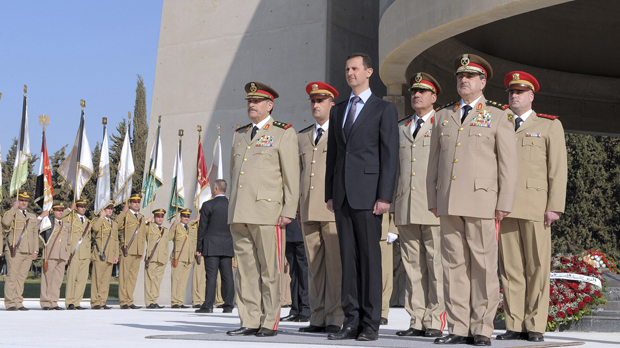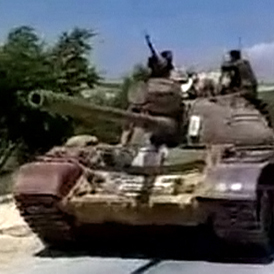Is Syria sliding into civil war?
As army defectors battle in Jabal al-Zawiya, a rights group tells Channel 4 News of evidence that President Assad’s forces are stepping up a campaign of rape in affluent areas to ‘incite civil war.’

Will Davies from the rights group Avaaz told Channel 4 News that his organisation has evidence that a systematic campaign of rape is being ‘stepped up’ by Assad’s regime in the last two weeks to agitate certain groups.
He said 25-35 young women – who are mainly under the age of 18 and from affluent families – have been kidnapped and raped mainly across the province of Homs and in suburbs of Damascus.
“The majority of Syrians want change by peaceful means, they don’t want civil war, but the regime are pushing for it,” Mr Davies said.
the regime is playing a horrific and really nasty game here, Will Davies, Avaaz
“They are targeting and raping girls from affluent families to spark anger with those with money, not Assad’s Alawite elite, but certain sections of society that they want to provoke.
“They want a civil war, because they know they could crush it, the regime is playing a horrific and really nasty game here.”
The Syrian Ministry of Information did not respond to a request for a comment, and Channel 4 News was unable to verify Avaaz’s research.
Read more: Syrian forces 'raping and torturing young girls' says refugee
Free Syrian Army
The leader of Syria’s first organised resistance group, the Free Syrian Army, claimed on Thursday the group has more than 10,000 members and planned to overthrow President Assad’s “murderous regime.
Calling on other soldiers to join him, Colonel Riad al-Assad said: “They will soon discover that armed rebellion is the only way to break the Syrian regime”.
The group say on their Facebook page that their soldiers are some of the defected troops reported to be fighting during the latest government operation in the Jabal al-Zawiya region of Idlib province. But some have raised doubts about the Free Syrian Army’s leadership, the number of troops it has, and the financial sustainability of the movement.
They will soon discover that armed rebellion is the only way to break the Syrian regime, Colonel Riad al-Assad
At least 13 civilians and five defected soldiers have died in a number of villages in the region in the last week, twelve of whom have been killed in the last two days, according to the activist group the LCC. Other groups put the death toll much higher.
It comes after at least 60 people were killed and thousands of others were detained after three days of clashes between government forces and defected troops in the restive town of Rastan in the Homs province last week.
Read more: Turkey accused after defector returned to Syria

‘Unorganised and lacking support’
Wissam Tariff, formerly of the human rights group Insan and now working for Avaaz, told Channel 4 News it was more likely that around 3,000 troops had so far defected, but it was a number he said “was significant and growing.”
“We have seen an all too familiar pattern throughout the uprising. No one is supporting these guys. A group defect, they start by refusing to fire on
protesters, Assad’s forces move in, surround the town, the rebels run out of ammunition and end up hiding in civilian houses.”
He said that 18 high rank officers had joined the Free Syrian Army but the group were unorganised and lacked political and financial leadership.
Hozan Ibrahim from the campaign group LCC told Channel 4 News that the Free Syrian Army were spread too thin across the country.
“They are not really like an army at the moment, they are more a kind of militia to protect civilians spread all over the country,” Mr Ibrahim said.
“I fear it gives an excuse to justify killing civilians on a more massive scale,” he continued, raising fears of the possibility of another 1982 style Hama massacre in which over 30 000 people were killed.
But Mr Ibrahim believed an armed insurrection inside Syria is now more likely to gather momentum after the failure to pass a UN resolution condemning president Bashar al-Assad’s regime on Wednesday.
200 people have died in Syria since September bringing the total death total to over 2900, according to the latest UN figures.
